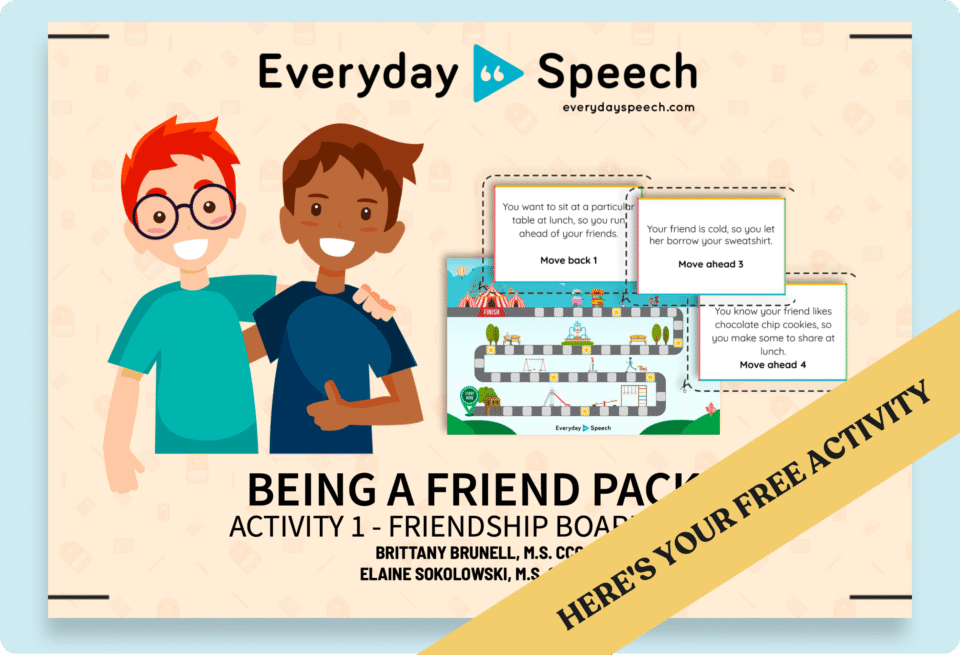Free High School Worksheet: Teach Students How to Practice Positive Self-Talk
Get free social skills materials
No-prep lessons on self-regulation, emotional recognition, conversation skills, and more.
Sign up hereStudents talk to themselves all day long. It might not always be out loud, but it’s constant—narrating, reacting, and interpreting what’s happening around them. And for many teens, that internal voice is more critical than kind.
Related resources:
Helping students become aware of their inner dialogue is one of the most practical ways to support their mental health. It teaches them that their thoughts are not fixed truths—they’re habits. And those habits can be changed.
The Positive Self-Talk Sorting worksheet from Everyday Speech gives high school students a way to spot unhelpful thinking patterns and practice turning them into something more productive. It’s a free, low-prep activity that helps students build mental resilience, self-awareness, and emotional regulation.
In this article, you’ll get:
- A breakdown of what’s inside the worksheet
- A step-by-step lesson plan for classroom use
- Reflection prompts and group discussion strategies
- A free download link to start using it today
Download Self-Esteem Activities for Teens
No-prep worksheets to build confidence, reflection, and independence.
Why Self-Talk Matters for Mental Health
Students may not realize how much their thoughts shape their experience. A single setback, mistake, or moment of embarrassment can spiral into something much heavier when paired with internal scripts like:
- “I always mess things up.”
- “No one actually likes me.”
- “I’m going to fail, so why try?”
When these thoughts become automatic, they can affect motivation, confidence, focus, and even relationships. Teaching students to recognize and challenge this kind of thinking helps them:
- Respond to setbacks without getting stuck
- Reduce negative self-comparisons
- Develop a more realistic and encouraging internal voice
- Build long-term strategies for handling stress and anxiety
This doesn’t mean pretending everything is great. It means helping students replace exaggerated, self-critical thoughts with grounded, supportive ones they can actually believe.
What’s Inside the “Positive Self-Talk” Worksheet?
The Positive Self-Talk Sorting worksheet includes a series of common self-talk statements. Some are helpful and encouraging. Others are critical, discouraging, or distorted.
Students are asked to:
- Sort each statement into “Positive Self-Talk” or “Negative Self-Talk”
- Discuss why certain phrases may be more harmful than helpful
- Reflect on how their own thinking might shift in certain situations
The worksheet provides a structure for something that often feels invisible: the way students speak to themselves.
Download Self-Esteem Activities for Teens
No-prep worksheets to build confidence, reflection, and independence.
How to Teach the “Positive Self-Talk” Lesson
This activity works well as a full-class discussion, a journaling exercise, or part of a mental health check-in. Plan for 20–30 minutes total.
Step 1: Introduce the concept of self-talk (5 minutes)
Start with a short conversation:
- “What is self-talk? When do you notice it happening?”
- “Does your inner voice help you—or make things harder?”
Share examples of how internal dialogue can shape performance or emotion. For instance:
- “When I walk into a test thinking, ‘I’m going to bomb this,’ I usually feel frozen.”
- “If I tell myself, ‘I know the material, I just need to focus,’ it’s easier to start.”
Let students know this isn’t about ignoring problems. It’s about helping themselves stay in a mindset where they can keep going.
Step 2: Complete the worksheet (5–10 minutes)
Pass out the sorting worksheet. Ask students to label each statement as either positive or negative self-talk.
Optional: After sorting, have them choose one negative statement and rewrite it in a more helpful or realistic way. For example: “I’m so bad at this” might become “I’m still learning this, and I’ve improved before.”
Step 3: Facilitate a group discussion (10–15 minutes)
Review the statements as a class. Ask:
- “Which ones were tricky to sort?”
- “Have you ever caught yourself thinking something similar?”
- “Why do you think negative self-talk can feel so believable?”
Encourage students to share real examples if they’re comfortable. Emphasize that everyone has negative thoughts sometimes. The goal is not to eliminate them entirely, but to challenge them when they aren’t helpful.
Step 4: Reflect on recent experiences (5 minutes)
Invite students to think about a recent challenge or stressful event. Ask:
- “What did your self-talk sound like during that situation?”
- “Looking back, would you change how you spoke to yourself?”
This reflection helps students begin to notice patterns—and opens the door to more intentional thinking in the future.
Why We Recommend This Resource
This worksheet supports students by:
- Making internal thinking patterns visible and discussable
- Creating a nonjudgmental space for reflection
- Teaching students how to reframe negative thoughts into helpful ones
- Reinforcing that they have influence over how they respond to difficult moments
Whether you use it during Mental Health Awareness Month, advisory, or as part of a resilience-building unit, this activity gives students a practical skill they can apply in and out of the classroom.
Want More? Access Additional Free Resources!
Everyday Speech is a no-prep digital curriculum that combines evidence-based video modeling, interactive web games, and digital and printable worksheets to make teaching social skills easy.
We offer a free 30-day trial where you can use our thousands of video lessons, worksheets, and games to teach social skills like self-esteem.
Here’s an example video modeling lesson for teaching positive self-talk from our curriculum:

